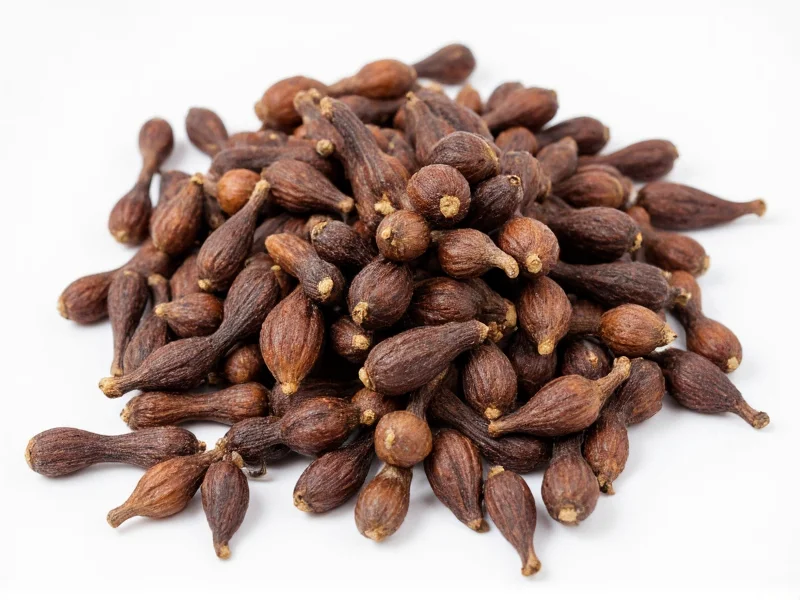The best substitutes for whole cloves are ground cloves (use ¾ teaspoon ground for 1 teaspoon whole), allspice (1:1 ratio with slightly sweeter profile), or a combination of cinnamon and nutmeg (½ teaspoon each per teaspoon of whole cloves). For savory dishes, mace works well at a 1:1 ratio, while star anise provides a similar licorice note in braises. The ideal substitute depends on your recipe type—baking, pickling, or beverages—as each alternative affects flavor intensity differently.
When you're mid-recipe and realize you've run out of whole cloves, knowing reliable substitutes prevents cooking disasters. Whole cloves deliver a distinctive warm, slightly sweet, and pungent flavor that's essential in many global cuisines. Understanding proper substitutions ensures your dish maintains balance without overpowering other ingredients.
Why Substitution Matters in Cooking
Whole cloves contain eugenol, which gives them their signature aroma and flavor. When recipes specify whole cloves, they're often intended to be removed before serving, providing subtle background notes. Ground cloves release flavor more quickly and intensely. The wrong substitute can dramatically alter your dish's character, making precise alternatives crucial for recipe success.
Top Whole Cloves Substitutes Ranked
Not all substitutes work equally well across different cooking applications. Consider these factors when choosing your alternative:
| Substitute | Conversion Ratio | Best For | Flavor Notes |
|---|---|---|---|
| Ground cloves | ¾ tsp = 1 tsp whole | Baking, spice blends | Stronger, more immediate release |
| Allspice | 1:1 ratio | Stews, mulled wine, pickling | Sweeter, hints of cinnamon/nutmeg |
| Mace | 1:1 ratio | Savory dishes, cheese sauces | Milder, more delicate clove flavor |
| Cinnamon + Nutmeg | ½ tsp each = 1 tsp whole | Baking, desserts | Softer spice profile, less pungent |
| Star Anise | ¼-1½ whole = 1 tsp whole cloves | Braises, Asian cuisine | Licorice notes, use sparingly |
Substitution Guidelines by Recipe Type
For Baking and Desserts
When substituting whole cloves in cakes, cookies, or pies, ground cloves provide the closest flavor match. Reduce the amount by 25% since ground spices release flavor more efficiently. For delicate desserts like custards or fruit compotes, try allspice at a 1:1 ratio—it offers similar warmth without cloves' distinctive bite. Pumpkin pie spice makes an excellent whole cloves alternative in fall baking, using 1¾ teaspoons per teaspoon of whole cloves required.
Savory Dishes and Stews
In braises, curries, or meat dishes requiring whole cloves, mace provides the most comparable flavor profile at equal measurements. Allspice works well in Middle Eastern and Caribbean recipes, while a single star anise pod can substitute for 4-6 whole cloves in Asian-inspired stews. For Persian rice dishes traditionally using whole cloves, try a pinch of cardamom combined with cinnamon.
Beverages and Mulled Drinks
When making mulled wine, cider, or chai, ground cloves work effectively at a 3:4 ratio. For a more complex alternative, combine equal parts cinnamon, nutmeg, and allspice. Remember that ground spices infuse faster than whole, so reduce steeping time by 3-5 minutes to prevent overpowering your beverage. This whole cloves substitute for mulled wine maintains the warming spice profile without becoming medicinal.
Pickling and Preserving
Pickling recipes often specify whole cloves for their slow flavor release. The best whole cloves substitute for pickling is allspice berries at a 1:1 ratio, as they maintain structure during the canning process. Alternatively, wrap ground cloves in cheesecloth to approximate whole cloves' controlled infusion. For quick refrigerator pickles, use ¾ teaspoon ground cloves per cup of brine.
Avoiding Common Substitution Mistakes
Cooks frequently make these errors when replacing whole cloves:
- Overcompensating - Using equal amounts of ground cloves instead of adjusting for potency
- Ignoring recipe chemistry - Not considering how substitutes interact with other spices
- Using inappropriate alternatives - Trying ginger or turmeric which create completely different flavor profiles
- Adding substitutes too early - Ground spices burn faster than whole in sautéing
When substituting in delicate dishes like custards or light sauces, always start with 50% of the recommended substitute amount, then adjust to taste. The how to replace whole cloves in recipes properly depends on understanding these nuances.
Storage Tips for Substitute Spices
Keep your substitute spices fresh by storing them in airtight containers away from light and heat. Ground spices lose potency fastest—use within 6 months for best results. Whole spices like allspice berries or star anise maintain quality for 1-2 years. Test older spices by rubbing a small amount between your fingers; if the aroma is weak, it's time to replace them. Proper storage ensures your whole cloves alternative maintains its intended flavor impact.











 浙公网安备
33010002000092号
浙公网安备
33010002000092号 浙B2-20120091-4
浙B2-20120091-4